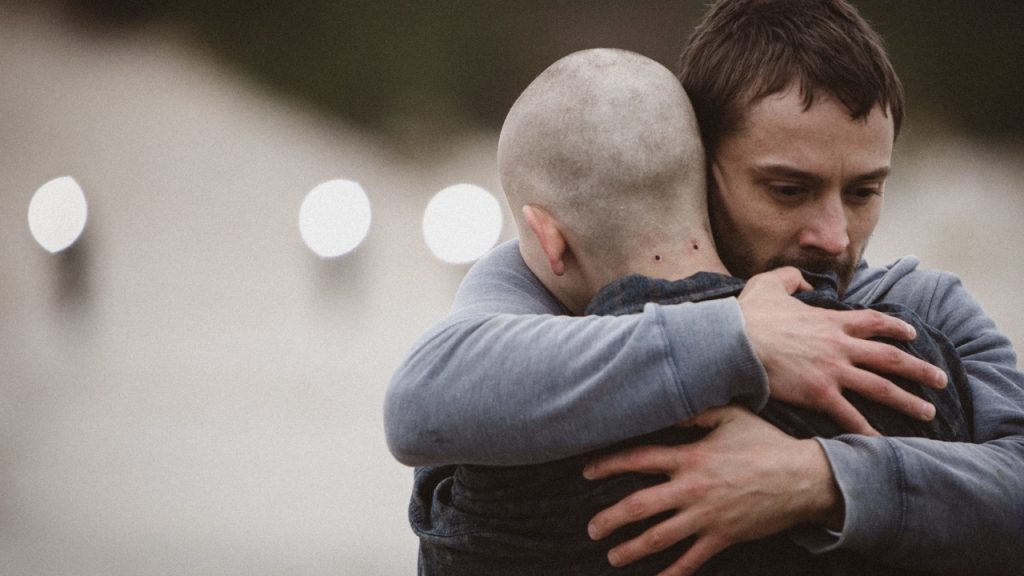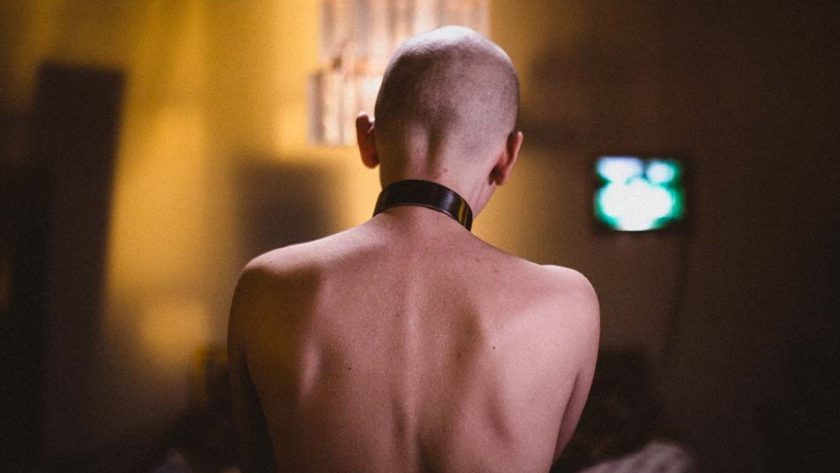Alexia Mihaila reviews a Polish dystopian story about a boy who tries to stop a corrupt state from legally enslaving criminals.
In the Poland of 2028 the prison system has been eschewed in favour of legal slavery: criminals dosed with Vaxina (a substance that erases memories), collared with trackers, and sold on the human market. This is the dystopian reality of The Day I Found a Girl in the Trash, starring writer and director Michal Kryzwicki as Szymon, with his co-writer Dagmara Brodziak also co-starring alongside as Blue. The film proposes a genre cocktail of rom-com tropes, sci-fi drama, and light-hearted comedy, all in aid of a message about the ethical costs of the power of technology.
Szymon is the martyr and saviour of this tale, an anti-automaton (automation being the name for the criminal ‘justice’ system found in this universe) YouTuber and activist who decides to commit suicide on New Year’s Day as a form of protest, only to find himself catapulted into short stardom by those who want to see him do it on a live broadcast. The plot therefore perhaps resembles a more developed indie adaptation of the final scene of teen flick Nerve, and also makes a parallel to Black Mirror‘s Hated in the Nation. In a more general sense, the film finds reflections in cancel culture, where people feel falsely connected and subjectively insensitive to a situation they may not understand, but do have power over.
With over 85 % of Poles supporting the automation project, freeing someone immediately lands one with criminal charges and the sentence of automaton itself. Those automated are enslaved and reduced to the cluelessness of house pets who need to have their trust earned through food and petting so that one might have a chance at ‘communicating with them’. Such is the case for Szymon, who finds Blue near a trash can, scared after escaping from her owner, akin to a stray dog, and so he takes her in, bathes her, and feeds her, becoming her saviour.

In Poland, only 4.8% of all prisoners are women, and so the chance of finding a woman slave would’ve been very slim. It perhaps would have been much more interesting if Szymon found a ‘boy in the trash’; one wonders if he would still act the same. His intentions always rest unclear, an indecisive, flawed character whose activist nature long ago alienated him from his community, dubbed a boy who cried wolf. He longs to interact with people that understand him, unlike his father — “You’ve been dead to me for a long time at your own request and people build their lives around the living” — even if that social interaction comes from a child-like, brainwashed woman. Maybe he just needs someone to talk to who won’t judge him: “You must know that the world isn’t just the two of us. I know it’s great now because it’s just us.” He has no friends apart from his corrupt manager and some neighbors, hence his thirst for equality, change, and persisting anger is justified, but not understood.
The opening scene, of Blue being bathed, is reminiscent of My First Summer (2020), but rather than a compassionate moment, this quickly turns into sci-fi gore, Blue’s chip removed from her neck with a sharp razor, her trust dismantled. As the two embark on a journey to automaton-free Sweden, Blue picks up a chicken from a farm, in a way similar to how children like to play with baby dolls in order to get a sense of stability and maturity by taking care of something else. However, as the title implies with its “I”, the story is centered around Szymon; these moments of child-like allegory is about as much character development as you’ll see of Blue throughout. Another parallel to My First Summer is the way in which the leads are chased down by the police to a lake, symbol of stillness and change, where Szymon promises Blue that he’ll never leave her and teaches her how to minimally survive on her own, but I can’t help but notice that Szymon was telling that to himself, realising he’s gone too far to go back to a simple life: “There’s this word that lets you dodge anything: OK.”
The film leaves us questioning the fate of the leads and it definitely has a little bit of everything for everyone: some sci-fi, drama, comedy, even romantic charm. Did the film accomplish its premise of making sure people understand human rights and don’t violate them? Hopefully. Will people at least know technology has its moral consequences? Sure! Overall, it’s not a groundbreaking story, but the cinematography is good and the tone transitions from dark to a more hopeful drama in the end, so it’s worth a watch if you are interested in light dystopia.
Watch the trailer for The Day I Found A Girl In The Trash here:




